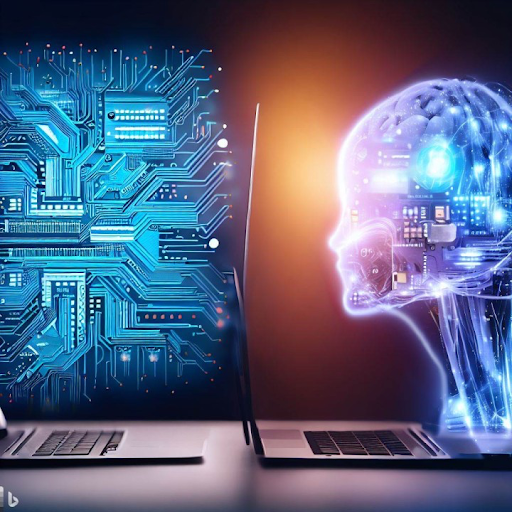Artificial Intelligence (AI) has received more attention than ever in recent years, doing everything from generating text-based prompts with ChatGPT to organizing facial recognition networks containing hundreds of millions of people, to correctly diagnosing patients with diseases and developing self-driving technology. Nowadays, it seems that AI can do everything. But in the field of computer science, which is the study and development of computer principles, designs, and applications, can AI truly replace the efforts and careers of humans? Will it be used as an integral tool in the field, or will it merely serve as a fad that will soon die out? The answer is far more complicated than it initially may seem.
Right now, AI is already greatly assisting with computer science careers in various ways. For example, data breaches have quadrupled in the past 10 years, increasing from 447 in 2012 to over 1,800 in 2022, and there have been over 5.5 billion malware attacks last year according to Statista. These attacks result from errors or oversights in human code, and given that heavy-traffic websites and complex programs can require up to millions of lines of code, it would be quite easy for a simple error to slip by humans and cause catastrophic damage. However, AI can review code at a rate exponentially greater than humans, being able to review thousands of lines of code a second, compared to a professional programmer who could only review up to a few hundred lines of code per hour. Therefore, AI could replace the efforts of thousands of programmers at once and identify mistakes in code that could prevent it from functioning as intended, or potential weaknesses leaving the code vulnerable for hackers.
Besides just fixing erroneous code, AI can also prevent tech workers from wasting their time on mundane, repetitive tasks. Roughly 20% of an average employee’s time is spent on repetitive administrative tasks, such as inputting data from one platform onto another, according to FinancesOnline. Not limited by typing speed or manual limitations humans have such as needing breaks, AI could complete this work instantaneously, allowing computer science workers to spend their time on more important tasks.
“The adaptive learning capabilities of AI can be harnessed to enhance information and computer security by swiftly identifying threats and automatically providing human experts with the information they need to coordinate response activities,” said Fan Zhang, an assistant professor at the Georgia Institute of Technology in the United States of America.
So, if AI is as capable as described, then why has it not completely taken over the field of computer science? Well, the answer comes from its limitations, and how it can be manipulated to cause cataclysmic damage.
The biggest flaw of AI in general is that it can only be as effective as the data it is trained upon. In computer science, this means that if some of the programs the AI is based on have human errors, these could be reflected in the AI’s work. Considering that AI can be thousands of times as efficient as humans, errors in code could cause far more damage than human errors, and subsequently take much longer to be fixed. Although there is much to be gained with AI, its implementation can cause far more damage as well.
Additionally, biases can be found in AI programs. For instance, in 2017 a Facebook algorithm which was designed to remove hate speech from the platform was found to be considerably more likely to remove hate speech against black people than against white people. This largely occurred due to the bias within the platform’s users, which the algorithm was trained off of. Likewise, an automated AI program lacks the unique variety in experience humans have, with its only point of view being based on the information it is given. Therefore, AI programs can be far more or less representative of a certain subset than is actually reflected in the real world, which could weaken or alter the original purpose of the program.
Lastly, although AI has many benefits in the world, it can be used to intentionally cause harm as well. Through ‘brute force attacks,’ an automated supercomputer can try up to 1,000,000,000 passwords per second to hack accounts of financial or political information. If an AI program does manage to access important information, it could have great real-world consequences, such as leaking government operations, stealing funds, or spreading malware onto a great network of other devices.
Given these various pros and cons, what do experts believe AI holds for the future of computer science? Harvard Business School professor and author Karim Lakhani recently gave his thoughts on the subject in an interview. Analyzing the benefits and weaknesses AI imposes, he gave his overall opinion that in the computer science field, “AI is not going to replace humans, but humans with AI are going to replace humans without AI.”
Much of AI’s potential has yet to be unlocked, as new technologies are allowing AI to continue developing each and every day. From where our society currently stands, a large faction of computer science experts agree that while AI does and will continue to greatly assist in many of the aspects of the field, it will not be able to completely replace the efforts of human developers. But whether we are right in assuming that AI’s destiny is to assist but not replace computer science careers, or wrong in that AI will serve little purpose in the field or eliminate human jobs, only time will tell.


Lorraine Daliessio • Dec 4, 2023 at 4:47 am
The insight was educational and thought provoking.